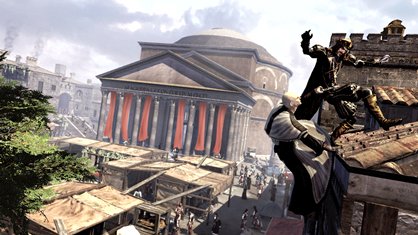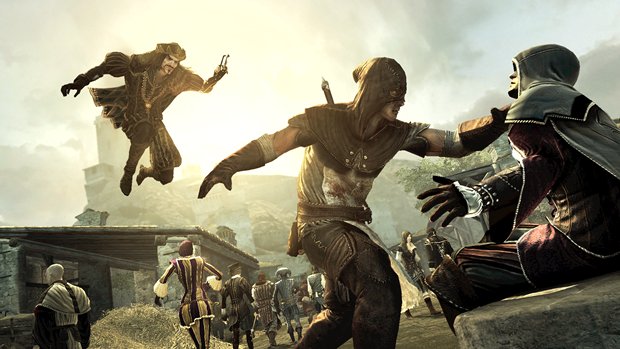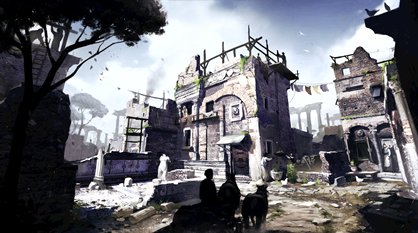As you start the game as Ezio, a fully-fledged assassin, how are you planning to encourage progression?
Patrick Plourde: With Ezio as the master assassin, we can explore a new angle – it’s about leadership, and being more reflective on your life. With a new character you have to restart with new motivation. We have a guy at the midpoint of his life who learns that he’s a vessel. He fulfilled his mission and wonders what to do next. You’re still an assassin, you’re still fighting Templars. There’s a lot of stuff to do. The Borgia are more powerful than ever. Roderigo is back, but Brotherhood is going to be more about his son, Cesare Borgia, at the height of his family’s power. We’re following real history, and playing with it. We’re telling people our version of those events. But in terms of gameplay progression, we’re going for a different angle than AC II.

How do you go about recruiting followers?
VP: It’s systemic. We wanted to dress it and justify it. We wanted it to be a portal for saving lost souls.
PP: As you take away the power of the Borgia in Rome, you increase your own power. That enables you to have a bigger guild. There are people that are fighting the Borgia in the world, and you go there, fight with them, and they see you and ask to join your guild. Once there, you are able to send them on assassinations that happen elsewhere in Europe. You won’t actually be able to play these assassinations, but players are going to be able to read the story about what happens. You also get paid by the guild and you can use it to acquire new skills.
During each mission there are assassins everywhere in the shadows and they are available on call - you use the [left shoulder button] for context sensitive commands. Say you’re in a fight, and you need help, you can have the best fighter come to your aid by tapping [left shoulder button].

VP: We wanted to avoid having to micromanage. There are RPG elements, but it needs to be contextual.
Sign up to the GamesRadar+ Newsletter
Weekly digests, tales from the communities you love, and more
PP: It starts with strategy (where you upgrade characters before each mission) then once you’re in the game it’s more about how you react. You could use assassins to set up a trap and use distractions to access a target – like provoking a fight while you walk around undetected. They’ll have access to ranged weapons, smoke bombs – all the tools you have.
Can you tell us about the changes to the combat system?
PP: We changed the code for the AI and removed parts that had them just standing and waiting. They’re going to be able to interrupt the assassin as he’s making moves. There will be more reactivity in the game world too. Also, as soon as you start a combo, as long as you’re not interrupted, you’re going to be able to kill enemies in one shot.
VP: We favoured a defensive system in AC IIand this was appreciated by many players, but the more hardcore player wanted to get done with it and go faster and get rewarded. So we said okay, let’s keep the best bits and rewarded offensive play more.

Did you consider incorporating a co-operative mode into the single-player?
VP: We have a problem with co-op. We did consider it, but the thing is, we’ve been considering it since the first Assassin’s Creed. We haven’t justified it yet, and in our universe everything is justified. A subject wouldn’t be able to have two ancestors at the same time. It just doesn’t work in that world. We’re justifying the multiplayer with the Templar universe. That allows us a brand new range of options to tell a different story. We’ll find a way for co-op. It’s going to be there for sure… eventually.
Jun 11, 2010


